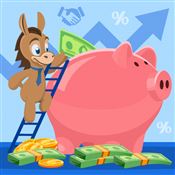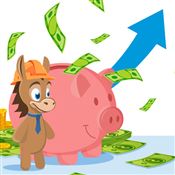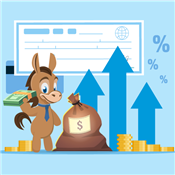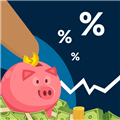High Yield Savings Account Downside
Ad Disclosure: This article contains references to products from our partners. We may receive compensation if you apply or shop through links in our content. You help support CreditDonkey by using our links.
High-yield savings accounts with good rates are tempting, but before you decide, know the downsides first. Read on for all the details.
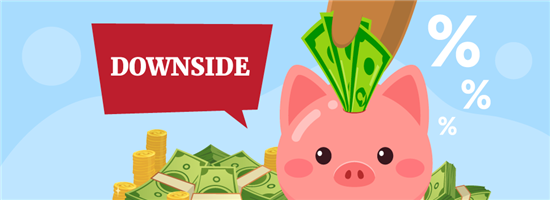 |
High-yield savings accounts are not a one-size-fits-all solution. Though you can get competitive interest rates, there may be downsides that might not be ideal for some individuals.
Read on to find out the disadvantages of high-yield savings and who is better off without one.
Interest Rates Tend To Fluctuate
The interest rates on high-yield savings accounts can change at any time. In general, they follow Federal Funds rate changes. So when market conditions are bad, the rate can go down and vice versa.
If you prefer earning a fixed rate, it would be best to check out certificates of deposit (CD) instead.
- Western Alliance Bank:
High-Yield Savings Premier - 5.36% APY - FVCbank:
High-Yield Savings Account - 5.26% APY - NexBank:
High-Yield Savings Account - 5.26% APY - Jenius Bank:
High-Yield Savings Account - 5.25% APY - CloudBank 24/7:
High Yield Savings Account - 5.24% APY
Limited Physical Accessibility
Many high-yield savings accounts are offered by online-only banks. Since they have limited or no physical branches, they have lower overhead costs that allow them to offer high rates.
However, this might be a problem for people who like banking in person. Fixing issues could also take longer because you can't simply visit a branch to get them resolved.
Most high-yield savings accounts don't accept cash deposits. This is because many online banks don't have physical locations, meaning in-person banking is not possible. The common modes of funding your account is through electronic transfers and mobile check deposits.
Potential Fees And Balance Requirements
Some banks impose monthly charges and balance requirements on their high-yield savings accounts. It can be difficult if you don't have enough money to maintain recurring payments.
It can also reduce your earnings, which is not good if you are opening the account to save money. Luckily, some banks have $0 fees and no minimum balance requirement.
Yes, they are. The interest earned in a high-yield savings account is considered by the IRS as taxable income.[1]
Possible Withdrawal Limits
Normally, you can only take money out of your high-yield savings account six times a month because of federal rules.[2] But, because of COVID-19, this rule was suspended and remains on hold today.[3]
Still, some banks might have their own rules, so it's best to read an account's disclosures beforehand.
The main difference between the two is that a high-yield savings account offers better interest rates compared to a traditional one. They may also have different levels of accessibility as many high-yield savings accounts are offered by online-only banks.
Not For Long-Term Goals
High-yield savings accounts aren't ideal for long-term savings goals due to the risk of inflation. That is, your earnings might not keep up with increasing prices.
That's on top of interest rate changes. So you can't expect stable earnings even if you maintain a single high-yield account over an extended period.
Opportunity Cost
High-yield savings accounts can help your money grow passively. But admittedly, they are not as profitable as other riskier investments. If your money is in a high-yield savings account only, you could be missing out on better returns elsewhere.
Try to build a diverse investment portfolio to bump your earnings with more profitable options.
Who Should Not Open a High-Yield Savings Account?
High-yield savings accounts might not be the best for those with long-term goals or for people who prefer riskier investments. They don't give the highest returns, especially compared to available alternatives that have greater profit potential.
Additionally, it is not ideal for people who prefer traditional banks with physical branches because high-yield savings accounts mostly involve online transactions.
Are High-Yield Savings Accounts Safe in Recession?
If you have money in a high-yield savings account during a recession, you can rest easy knowing that your funds are secure. This is because most banks are protected by the FDIC, which means deposits are federally insured up to $250,000 per ownership category.[4]
High-Yield Savings Alternatives
If you think a high-yield savings account is not for you, check out the following alternatives:
- Certificate of Deposit (CD)
If you prefer earning a fixed rate, choosing a CD might be a better option. The interest stays the same throughout your chosen term, even if market conditions change. Just remember that your money will be locked up and you can only take it out without paying an early withdrawal penalty upon maturity.Who is paying the best CD rates?- Western Alliance Bank:
5-Month High-Yield CD - 5.30% APY - Banc of California:
3-Month High-Yield CD - 5.28% APY - Dayspring Bank:
1-Month High-Yield CD - 5.25% APY
- Western Alliance Bank:
- High-Yield Checking Account
A high-yield checking account lets you earn interest on your checking balance. It is a good choice for those who want to enjoy a decent APY while having their funds within reach through a debit or ATM card.Who offers high-yield checking accounts?- OnPath Federal Credit Union:
High Yield Checking - Up to 7% APY - Consumers Credit Union:
Free Rewards Checking - Earn Up to 5% APY - Axos Bank:
Rewards Checking - Up to 3.30% APY
- OnPath Federal Credit Union:
- Bonds
If you want more than just regular bank savings, you can try bonds. It is a pretty safe way to earn more money with good rates and regular interest payments, similar to a CD.Treasury bonds are good in particular because your investment is backed in full faith by the government.
Bottom Line
High-yield savings accounts are great boosters if you're saving money. But, they also come with drawbacks such as fluctuating rates, withdrawal limits, and limited in-person banking.
So, it's crucial to weigh both the benefits and drawbacks before fully committing, and remember to explore other options as well!
References
- ^ IRS. Topic No. 403 Interest Received, Retrieved 02/14/2024
- ^ Federal Reserve Board. Regulation D Reserve Requirements, Retrieved 02/14/2024
- ^ Federal Reserve Board. Federal Reserve Board announces interim final rule to delete the six-per-month limit…, Retrieved 1/24/2024
- ^ FDIC. Deposit Insurance, Retrieved 02/14/2024
Write to Darlene Santos at feedback@creditdonkey.com. Follow us on Twitter and Facebook for our latest posts.
Note: This website is made possible through financial relationships with some of the products and services mentioned on this site. We may receive compensation if you shop through links in our content. You do not have to use our links, but you help support CreditDonkey if you do.
|
|
|
